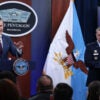A leading Republican critic of the Obama administration’s policy toward Iran is alleging that the U.S. government violated federal law when it delivered $400 million in cash to Tehran on the same day the country freed four American prisoners.
“I want to know what Obama administration employees were involved with this and how long do they serve in prison,” said Rep. Mike Pompeo, R-Kan., a member of the House Intelligence Committee. “There is no doubt they violated federal law when they transferred U.S. taxpayer funds to a state sponsor of terrorism.”
Pompeo’s assertion to The Daily Signal goes farther than most Republicans have gone in their criticism of how the administration handled the cash payment, which the government says was not related to the prisoner release, but the result of a settlement with Iran of a decades-old financial dispute over an uncompleted arms deal.
Because the money already belonged to Iran, and did not have to be appropriated by Congress, most lawmakers and observers say the administration acted lawfully. Critics are more concerned that if Iran considers the $400 million to be a ransom payment, Tehran will be encouraged to seek similar terms for other dual national hostages it unlawfully holds.
“While I think the $400 million cash payment was handled in an incredibly stupid way, I don’t agree with Rep. Pompeo that the administration violated the law,” Patrick Clawson, the director of research at the Washington Institute for Near East Policy, said in an interview with The Daily Signal. “The money is coming from a settlement account, which is frequently used for nonappropriated purposes. They’ve been in meetings trying to settle this claim for 20 years.”
Other observers say the administration should have informed Congress about the details of the $400 million cash payment before it happened.
“It may not be a legal issue, but it’s a best practices issue,” John Hannah, a senior fellow at the Foundation for Defense of Democracies, said in a interview with The Daily Signal.
“These were sanctions established by Congress and for the president then to seek to circumvent them, even if it’s technically legal, without notification or consultation with Congress, is just bad practice and something the Congress ought to be upset about,” added Hannah, who was the national security adviser for Vice President Dick Cheney in the George W. Bush administration.
“I want to know what Obama administration employees were involved with this and how long do they serve in prison,” said @RepMikePompeo.
Pompeo, however, is asking for more. He told The Daily Signal he plans to send letters to the Treasury and Justice departments in the coming days seeking more information on who in the administration authorized the $400 million payment to Iran, and the government’s justification that the transaction was lawful.
“Until the president made an affirmative decision to pay that claim, it wasn’t Iran’s money,” Pompeo said in an interview. “It was American money. So they broke the law. The thrust of it is, ‘It’s illegal. You did it.’ And Congress has a role of identifying a breach of law and referring violators to the Justice Department for prosecution.”
After The Wall Street Journal last week broke the story reporting the details of the cash payment, Republican lawmakers were quick to call it a ransom, while some members of relevant congressional committees expressed frustration about not being fully informed by the Obama administration about what happened.
In January, Obama announced publicly that the U.S. and Iran had struck a deal for the U.S. to pay Tehran $1.7 billion to settle an arms deal from before the Iranian revolution of 1979. On the same day, Obama said the Iranian nuclear deal had been implemented, and that American hostages had been released.
The new Wall Street Journal story shed further light on what happened, reporting that the first installment of the $1.7 billion—the $400 million cash—had been shipped to Iran in the form of euros and Swiss francs on an unmarked cargo plan.
“We’ve been chasing this since January, when President [Barack] Obama announced he was giving Iran almost $2 billion,” Pompeo said. “In both classified and unclassified briefings, at no time was I told the timing of the money transfer, or the format in which it was transferred.”
>>>Republicans Consider Next Steps After News of Obama Administration Cash Transfer to Iran
The chairman of the Senate Intelligence Committee, Sen. Richard Burr, R-N.C., told a local television station last week that he too did not know specific details of the $400 million cash payment.
“It alarms me as the chairman of the Intelligence Committee that something of this magnitude was not briefed to me,” Burr told WGHP Fox Greensboro. “Not only prior to the exchange but since the exchange. Only through, in this case, the Wall Street Journal do the American people know the truth about what was committed to by the American government to the Iranian government.”
Sen. James Lankford. R-Okla., a member of the Intelligence Committee, did not learn about the cash payment until the administration announced it in January, his spokesman told The Daily Signal.
In June, Lankford offered legislation that requires the White House to make public the details of its money transfer to Iran. He hopes the bill gets a vote before the full Senate later this year.
“Many Americans, including myself, have been very suspicious of the transfer of $1.7 billion dollars to Iran, just hours after American prisoners are released and the implementation of the Iran nuclear deal,” Lankford told The Daily Signal in a statement. “I have worked to bring more transparency to all of the Obama administration’s reckless actions with Iran, especially any type of cash payment which helps fund the Islamic Revolutionary Guards Corps to wreak havoc and work directly against American interests in Syria, Lebanon, Israel, and Yemen.”
When Obama announced the settlement, he described it as savings for taxpayers, arguing that the U.S. ultimately was going to have to give Iran the money it was owed. He argued the government would likely have had to pay even more if the claim went through the normal arbitration process at an international claims tribunal court in Hague.
When the hostage crisis of 1979 was resolved two years later, the governments of Iran and the U.S. established the arbitration court in Hague to settle financial disputes between the two countries. Some of the outstanding issues were resolved, but the legal status of the failed arms deal was not.
“Iran will be returned its own funds, including appropriate interest, but much less than the amount Iran sought,” Obama said in January.
Speaking to reporters last week, Obama said the administration delivered the $400 million in foreign cash because U.S. sanctions law prevented the government from using dollars in transactions with Iran.






























